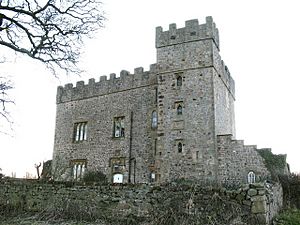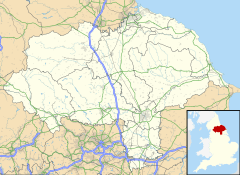South Cowton facts for kids
Quick facts for kids South Cowton |
|
|---|---|
 South Cowton Castle |
|
| Population | 188 (2011 census) |
| OS grid reference | NZ292022 |
| Civil parish |
|
| Unitary authority |
|
| Ceremonial county | |
| Region | |
| Country | England |
| Sovereign state | United Kingdom |
| Post town | NORTHALLERTON |
| Postcode district | DL7 |
| Police | North Yorkshire |
| Fire | North Yorkshire |
| Ambulance | Yorkshire |
| EU Parliament | Yorkshire and the Humber |
South Cowton is a small village in North Yorkshire, England. It is built on the site of an old medieval village that no longer exists. In 2011, about 188 people lived in the area around South Cowton.
The current village has only a few farms spread out, along with a castle and a church. Other nearby old villages, like Temple Cowton and Atley Cowton, are now part of the South Cowton area.
Contents
A Look Back in Time
The first village of South Cowton was started after the Norman Conquest of England. The Domesday Book, a famous survey from 1086, shows that Count Alan of Richmond owned South Cowton. It was managed by Godric the Steward. Old remains found by archaeologists suggest that this medieval village had at least 20 houses.
The Castle and Church
The two most important old buildings in South Cowton are South Cowton Castle and St Mary's Church. Both of these buildings were built in the 1400s. A man named Richard Conyers built them. He was one of the few lords who actually lived in the Cowton area.
When the Village Disappeared
Something very interesting happened between 1489 and 1490. Richard Conyers decided to tear down the village of South Cowton! He made the people living there move out. He did this to turn the land into pastures for animals, like sheep. This is why the original medieval village is no longer there.
How South Cowton is Governed
South Cowton is part of an area called the "Cowtons electoral ward." An electoral ward is a small area used for voting in local elections. This ward stretches north to a place called Over Dinsdale. In 2011, about 1,744 people lived in this whole ward.
 | DeHart Hubbard |
 | Wilma Rudolph |
 | Jesse Owens |
 | Jackie Joyner-Kersee |
 | Major Taylor |


